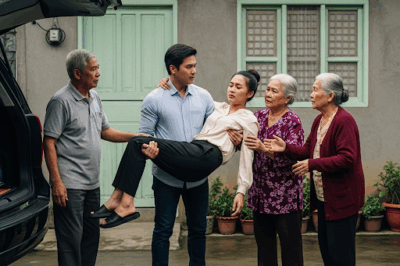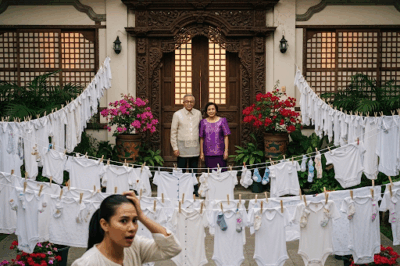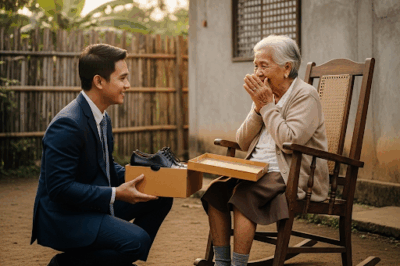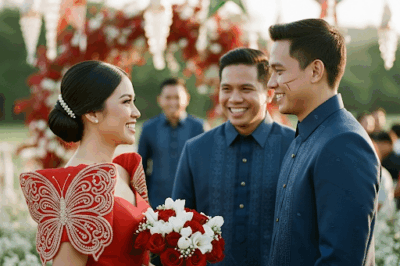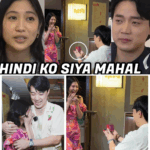“Shadow Bills”
Last week, I called Mom to ask for some money, and she transferred the call to Dad, who promised to send me some during the week. Happy and hopeful, I cleaned out all my empty food containers, getting ready to receive it.
Two days passed, then three, and soon a whole week went by… but there was no word from Dad. I called again yesterday, nearly in tears, and Dad told me he hadn’t been able to send the money, but asked me to come home to pick it up. I agreed, and within an hour, I was already leaving the city, heading back to the village from the university.
Because of the bad road conditions and trying to avoid potholes everywhere, I arrived later than expected. It made sense to spend the night, get the money in the morning, and then head back to university.
But something felt off at home. Dad’s immediate sister had come to help with the cooking because Mom was bedridden.
“Mom?” I called softly as I entered the room and sat on the edge of her bed, gently placing my palm on her forehead.
“Your father… money… he’ll give it to you… go eat… and…” she coughed painfully before trailing off mid-sentence. She closed her eyes. I had so many questions in my head, but I thought it would be wiser not to disturb her, hoping to return later when everyone was asleep.
Later that night, I suddenly felt pressure in my bladder and rushed out of bed to the bathroom. While relieving myself, I heard strange sounds that reminded me of my earlier intention to check on Mom again. When I finished, I flushed and quietly made my way to her room.
The strange sounds grew louder as I approached. Curious, I gently pushed the door open.
There—right before my eyes—Mom was sitting at the edge of the bed with bulging eyes, vomiting what seemed like tons and tons of naira bills, while Dad was on the floor, hastily stuffing the money into a large bag.
I froze. Slowly, I turned around in a daze and returned to my room. I sat on the floor and stared blankly all night.
I felt numb.
Suddenly, a loud knock snapped me back to reality.
“Open the door,” came my aunt’s voice, cold and urgent. “Now!”
I stood up quickly, my heart pounding. I opened the door cautiously. She entered, her eyes scanning behind me, surveying the room as if she expected someone to be hiding there.
“You saw something,” she said bluntly.
I swallowed. “What’s going on? Why is Dad…? Why is Mom…?” The words got stuck in my throat.
My aunt’s face hardened. “You weren’t supposed to see that.”
She closed the door behind her and sat on the edge of the bed.
“Listen to me very carefully. You love your mother, right?”
I nodded.
“Then forget what you saw. Forget this night. Take the money in the morning, say thank you, and go back to university.”
“But what was she doing?” I asked, trembling. “What was that… in her mouth? The money?”
My aunt leaned in, lowering her voice. “There are things that keep this family alive, and there are things that destroy it. Your mother made a sacrifice so you could go to university. So your father could feed this household. So all of us could survive.”
My stomach churned. “Are you saying that… mom is… producing money?”
“She’s not producing anything,” the aunt snapped. “It’s killing her. It’s draining her. Every bill she brings out is a piece of her life. And she’s been doing it for years.”
I backed away, as if her words had weight.
“They told us it would only be for a short time,” my aunt continued. “That the spirit would take only a little. But it lied. And now it’s too late. She coughs blood in the morning, vomits money at night. That’s our reality.”
I could barely breathe. “So that’s why she’s bedridden?”
“She has less than a week left,” my aunt whispered. “She begged your father to stop… but he refused. He says if she dies, we’ll use what’s left to bury her… and pay for your final year.”
I collapsed. Tears flooded my eyes, my throat closed tight with rage and horror. “She did all that for me? For us?”
“She did,” the aunt said, standing up. “So you better not waste it.”
And she left.
That night, I didn’t sleep. I sat on the floor, staring at the empty food containers I had cleaned with hope. Now, they looked like evidence of my guilt.
The next morning, Dad handed me a black bag.
“Count it later. Just go.”
I looked at him. Really looked. And for the first time in my life, I felt fear—not of him, but of the price we had paid to stay afloat.
I took the bag and got on the bus back to university.
But something inside my chest had changed.
Forever.
For days after returning to university, I lived on autopilot. I attended classes, responded when called, ate just enough… but inside, I was completely absent. The black bag remained under my bed, like a sleeping animal I refused to awaken.
I couldn’t touch it.
Not even look at it.
The thought of spending even a single bill made my stomach turn. Every time someone pulled out money in front of me, I saw the image of Mom… her glassy eyes, sweaty skin, vomiting banknotes. The wet, thick sound of each bill hitting the floor haunted even my dreams.
One night, I couldn’t take it anymore.
I took the bag, placed it on the bed, and opened it. It held neat stacks, all 1,000 naira notes, still wrapped in rubber bands. But some bills… had stains. Not blood, not exactly. Something darker, like life itself had seeped into them.
Trembling, I closed it again. In that moment, I knew I couldn’t just go on like nothing happened. I had to do something. I didn’t know what. Or how. But staying silent meant being complicit in her death.
So I started researching.
I asked questions carefully. I searched the library, hidden internet forums, old texts about animist beliefs, African rituals, and spiritual pacts. Not everything made sense, but some things kept repeating:
“The spirit of abundance does not give without taking.”
“Where there are bills without a source, there are bodies without souls.”
“What is vomited does not nourish—it poisons.”
I learned that there were secret family pacts, sealed in silence. That certain entities granted wealth in exchange for human life—usually that of a fertile woman or a mother. She became the channel, the “golden womb,” until she was consumed.
And then I understood: my mother was the living sacrifice of an ancestral pact.
I returned to the village without warning.
My father was surprised, but pretended to be happy. He hugged me, asked if the money was enough. I nodded, without telling him the truth.
That night, I stayed awake in silence, waiting for the sounds to return. And they did.
The vomiting. The gasping. The rustling of plastic. The hurried whispers of Dad counting.
I opened the door—this time without fear.
And I saw everything.
“You’re not hiding anymore?” my father said without looking at me.
“No. Not anymore.”
Mom couldn’t speak. She was emaciated. Her face was all bone and shadow. But when our eyes met, I saw something stronger than death: love. Guilt. And a silent plea.
I walked over. I knelt beside her.
“I’m going to stop this,” I whispered.
Dad scoffed. “Stop what? Our only way out?”
I turned to him, with a calmness that surprised even me.
“Your way out, Dad. Not mine. I don’t want anything that costs her life.”
And as I said that, I felt something break in the air. As if an ancient tension had suddenly eased.
My mother cried—not from pain, but from relief.
Dad stood, furious. “You don’t know what you’re saying. You have no idea what this spirit can do if betrayed.”
I looked straight at him.
“Then let it come for me.”
That night, I slept beside her, holding her hand.
Waiting.
If a spirit came… I would be there.
The days that followed were filled with tension and fear—but also with determination. I refused to let my mother keep paying for our survival with her life. I sought help, not just from books or online forums, but from the community.
I remembered Doña Teresa, a wise elder in the village known for her knowledge of traditional rituals and spiritual healing. I visited her at dawn, bringing the black bag—the bills that carried my mother’s life.
“This has to end,” I told her firmly. “How do we break this pact?”
She looked at me with eyes that seemed to pierce through time and said:
“Pacts are not broken by fear or force, but by truth and voluntary sacrifice. You must summon the spirit, speak to it, and offer something more valuable than the life it has taken.”
That night, I returned home with a plan. With Doña Teresa’s help, I prepared a simple ceremony, far from prying eyes.
My mother, though weak, insisted on being present. My father was hesitant, but fear and guilt kept him there.
We lit candles, placed sacred herbs, and with ancient words, we called upon the spirit.
I spoke on behalf of my mother, our family, and our desire to live without invisible chains.
“We offer what we never gave you before: respect and renunciation. We release my mother from your pact. We give you our vow to live with dignity and honest work. Take my sacrifice, if needed—but let her breathe again.”
There was a heavy silence. Then, a soft breeze passed through the room.
My mother coughed once more—but this time, without blood. Her eyes opened clearly, and a faint, sad smile appeared.
My father collapsed into a chair, exhausted, as if a great weight had been lifted from him.
From that day on, my mother’s health began to improve. It wasn’t miraculous or fast—but there was hope.
Dad changed. He stopped chasing easy money. He started looking for honest work. He apologized.
The family, though scarred, began to heal.
I finished university, and with pride, I handed my mother the diploma that had cost us so much.
Walking into the future wasn’t easy—but for the first time, it was free.
And I understood:
the true price of life should never be paid with life itself.
News
Wife Got Into an Accident, Husband Sent Her to Her Grandparents’ Home for Care—Four Months Later, He Returned to Pick Her Up, Only to Face a Bitter Surprise…/th
Wife Got Into an Accident, Husband Sent Her to Her Grandparents’ Home for Care—Four Months Later, He Returned to Pick…
My Husband Went on a Business Trip, But When I Visited My In-Laws, I Was Shocked to See Baby Diapers Hanging All Over the Yard/th
My Husband Went on a Business Trip, But When I Visited My In-Laws, I Was Shocked to See Baby Diapers…
TEACHER BUYS SHOES FOR A POOR STUDENT — 20 YEARS LATER, HE RETURNS WITH A SHOCKING GIFT/th
TEACHER BUYS SHOES FOR A POOR STUDENT — 20 YEARS LATER, HE RETURNS WITH A SHOCKING GIFT In a quiet…
Lê Minh, or Minh Scar, was nothing like people said—he was quiet, seasoned, and always appeared at the right moment to protect Trúc./th
Lê Minh, or Minh Scar, was nothing like people said—he was quiet, seasoned, and always appeared at the right moment…
One Chicken a Day – A Tale of Rats, Mystery, and a Village Legend/th
One Chicken a Day – A Tale of Rats, Mystery, and a Village Legend One chicken a day—it might not…
DNA Results Confirmed He’s My Son — But He Looks Exactly Like the Neighbor. The Bitter Truth Was Hidden for Years…/th
DNA Results Confirmed He’s My Son — But He Looks Exactly Like the Neighbor. The Bitter Truth Was Hidden for…
End of content
No more pages to load

